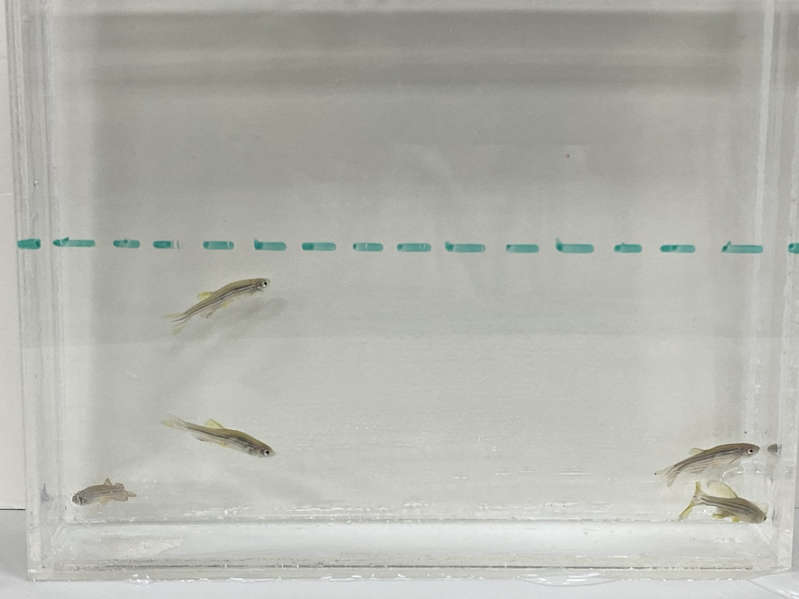
Danio rerio. Experience in determining the preferred area of the aquarium.
Russian scientists have found that immunomodulators, as well as their combination with the antidepressant fluoxetine, can help overcome anxiety in fish. To do this, biologists artificially created conditions for prolonged unpredictable stress in zebrafish fish, and then “treated” them with drugs. In the long term, these studies will help develop new methods of dealing with mental disorders caused by chronic stress. The results of the study, supported by a grant from the Russian Science Foundation (RSF), are published in Scientific Reports.
In everyday life, people are surrounded by many stress factors, such as hard work, constant city noise, anxiety and anxiety, lack of sleep. If intense stress, such as exhausting work, lasts for long – months or years – it can lead to serious mental health problems such as depression. Their treatment is difficult due to the fact that the symptoms can be very different, and their manifestation is influenced by many factors: genetic, social, environmental. In addition, stress often intensifies inflammatory processes, which weaken the immune system and can contribute to the development of other diseases. Scientists use laboratory animals to study in detail the causes and course of stress-related illnesses. Zebrafish are a good model for such work, because they are easy to breed, unpretentious, and their genome and brain physiology are quite similar to those of humans.
Researchers from St. Petersburg State University, National Medical Research Center named after V.A.Almazov, Russian Scientific Center for Radiology and Surgical Technologies named after Academician A.M. Granov (St. Petersburg), Moscow Institute of Physics and Technology (Moscow), Scientific Sirius Technical University (Sochi), Ural Federal University (Yekaterinburg) with colleagues from Maastricht University (Netherlands) analyzed the effect of stress on behavior and hormonal levels in zebrafish. Before the start of the experiment, a population of several dozen individuals was kept in standard, comfortable conditions for them: a large aquarium with an optimal water temperature and lighting. Then half of the fish were transferred to other aquariums, in which everything was not so favorable: the water temperature turned out to be higher or lower than usual, the predator was swimming or the water contained its “smell”, the light was too bright or absent at all, there was no food or similar stress conditions were in effect. … Various trials took place daily for eleven weeks, while biologists monitored the current state of the fish, and after that period they administered stress pharmacotherapy. To do this, scientists used the drug fluoxetine, widely used in medicine, as an antidepressant. The novelty of the approach lies in the fact that the researchers, in parallel with it, also gave the fish immunomodulators: lipopolysaccharide, a pro-inflammatory polymer from the bacterial cell wall that triggers an immune response, and eicosapentaenoic acid, which is a part of many animal fats and suppresses inflammatory reactions in the body. …
It turned out that fish that were under stress got into tight schools, also preferring the bottom of the aquarium, which indicated their increased anxiety. On the other hand, scientists have noted an increase in their ability to aversive learning – the ability to beware of danger. This was determined using an interesting test: zebra fish were placed in an aquarium, divided into light and dark halves. By their nature, fish prefer low-light places, so in the experiment they tried to spend more time in the dark part of the aquarium. But the researchers periodically applied electric current to this comfort zone, which made the fish swim away. It turned out that under such conditions, individuals that had previously experienced stress began to appear less often in the dark half than “calm” fish, which suggests that they quickly learned to avoid an unpleasant factor – electric current.
After conducting all the experiments, the scientists painlessly euthanized the fish, and used samples of their nervous tissue to study the hormonal state of the individuals. Treatment of “anxious” zebradanios with antidepressants and immunomodulators showed that fluoxetine, as expected, relieved anxiety and decreased stress-induced levels of norepinephrine in the brain. In addition, it turned out that the combination of fluoxetine with eicosapentaenoic acid had an even stronger effect: together they not only restored the calm behavior of fish and the level of stress hormone, but also increased the level of dopamine – the hormone of joy. When zebra fish were injected with lipopolysaccharide with fluoxetine, on the contrary, they became more anxious and gathered in even denser schools than with chronic stress.
“Our research has shown that it is possible to synergistically increase the effectiveness of stress therapy with both antidepressants and their combination with additional substances. For example, eicosapentaenoic acid, a polyunsaturated omega-3 fatty acid found in many seafood, not only helps fluoxetine fight stress, but also has an anti-inflammatory effect on the body, which is especially important in case of nervous disorders. In the future, we plan to study in more depth the interaction of fluoxetine and the immunomodulators of eicosapentaenoic acid and lipopolysaccharide with each other in order to understand the reasons for the increase or decrease in their effectiveness in combating stress, ”says Alan Kaluyev, project manager for a grant from the Russian Science Foundation, Doctor of Biological Sciences, Professor, Member of the European Academy and Head of the Laboratory of Biological Psychiatry, St. Petersburg State University.
Read also:
Russian chemists have received a luminous airgel
There is progress in philosophy and there are results
Russian scientists have created nanoparticles for early diagnosis and therapy of breast cancer
Russian physicists tested a new transition radiation detector at CERN
Scientists have discovered a chemical Rubik's snake, from which you can “fold” new heterocyclic molecules

